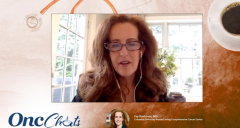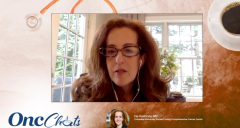
Understanding Lynch Syndrome and Associated Cancer Risk: Prevalence
In this first episode of OncChats: Understanding Lynch Syndrome and Cancer Risk, Fay Kastrinos, MD, MPH, provides a brief overview of Lynch syndrome and its prevalence in the United States and beyond.
Episodes in this series

In this first episode of OncChats: Understanding Lynch Syndrome and Cancer Risk, Fay Kastrinos, MD, MPH, of Columbia University Herbert Irving Comprehensive Cancer Center, provides a brief overview of Lynch syndrome and its prevalence in the United States and beyond.
Hi, my name is Fay Kastrinos. I’m an associate professor at Columbia University in the Division of Digestive and Liver Diseases, [and at] the Herbert Irving Comprehensive Cancer Center, I am [also] the director of the Inherited GI Cancer Risk and Prevention Clinic. I am with you today [to speak] about Lynch syndrome.
Lynch syndrome is a common inherited cancer syndrome; it’s mostly associated with colorectal cancer, as well as endometrial cancer. What many people don’t appreciate is that its prevalence is comparable to the well described and tested for hereditary breast and ovarian cancer syndromes associated with the BRCA genes. In the general population, about 1 in 300 individuals have Lynch syndrome, and most of them don’t even know it. In the United States, it’s estimated that nearly 1 million individuals with Lynch syndrome are unaware of their condition—that is, until cancer develops.
Our research has really focused on standardizing the identification of inherited cancer susceptibility through genetic testing in health; that is [done] before the diagnosis of cancer. [We want to] apply screening tests and risk-reducing strategies to prevent cancer in these patients; that is so that we can optimally identify “pre-vivors” with Lynch syndrome.
In the next few minutes, I will review the epidemiology related to Lynch syndrome, advances made for the optimal identification of Lynch syndrome, its associated colon cancer risks, and prevention strategies, as well as treatment advances. To end, I will present some future considerations associated with Lynch syndrome, as it relates specifically to prevention.
Check back next Wednesday for the next episode in the series.









































